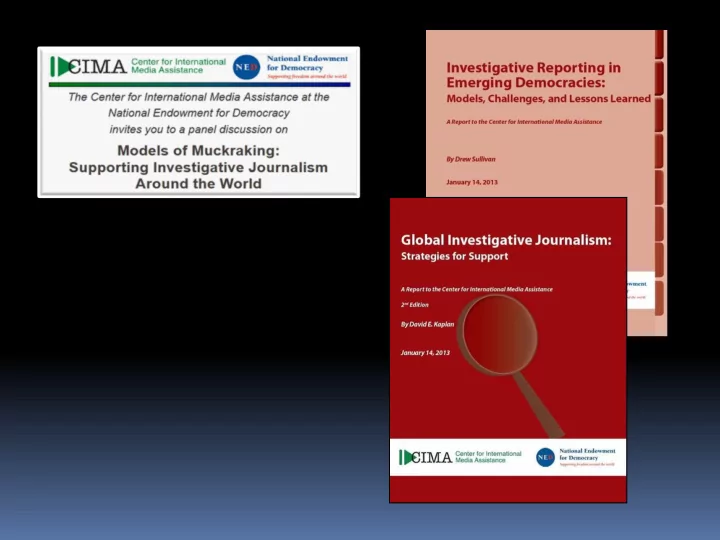

Definitions… What It Is heavy use of public systematic, in-depth, records original research and data/computer-assisted reporting reporting primary sources, forming What It’s Not and testing a hypothesis, and rigorous fact- Leak journalism checking. Critical reporting unearthing secrets Beat reporting focus on social justice Crime and corruption and accountability. reporting
Investigative journalism… is in serious need in Benin, Ghana, “a crucial pillar for fighting “…crucially contributes to freedom of Kenya, Mozambique, Nigeria, corruption… can have a significant expression and freedom of information” Rwanda, and Uganda. impact on improving governance at the national level.” “You need reporters who can find the ---- Janis Karklins, UNESCO --- African Peer Review Mechanism “directly contributes to reforms links and correlations between events. --- Economist Daniel Kaufman necessary for democratization such You need the resources to find and One of seven key gaps in media development expert as anticorruption, transparency, expose what is purposely hidden.” development funding. accountability, rule of law.” --- Gordana Jankovic -- UK Dept. for International -- Ivana Howard Open Society Foundations Development (DFID) report, 2007 Nat’l Endowment for Democracy
Challenges Lack of funding Changing technology Violent assaults Legal harassment Compromised owners Lack of access, public records Lack of standards Lack of training Lack of commitment
US International Aid FY2011 Media dev 0.4% Non-media aid 99.6%
Sources of Change Globalization: open borders, ICT International aid: seed money, grants and training Journalism nonprofits: training, reporting, networking, conferences.
Going Global…
The CIMA Survey 2007: 39 nonprofits in 26 countries 2012: 106 nonprofits in 47 countries
www.gijn.org @gijn
GIJC 2013 – Rio de Janeiro
Recommendations… Provide greater support to investigative journalism programs. Support the nonprofits – especially building capacity and revenue diversification. Different models for different countries. Integrate into broader media reform. Invest in a global networking infrastructure. Evaluate based on quality. Coordinate with investigative journalism professionals. Don’t fund data at the expense of reporting.
Foundation executive: “We no longer fund content.” Blogger Dave Winer: “Journalism itself is becoming obsolete. Now we can hear directly from the sources and build our own news networks.”
David Kaplan david.kaplan@gijn.org @gijn
Worldwide growth: 110 nonprofits in 42 nations Key role in battling corruption, exposing abuses, raising standards Many challenges Lack of skills, resources, trainers, access to info, supportive owners, laws, uncorrupt officials Credit: OCCRP
Making an impact… European Parliament 2012 report: plays a key role in “tracking irregularities, fraud and corruption, and uncovering misspending” in EU member states and EU institutions. Business leaders rank investigative journalism as best single tool to fight corruption – more effective than anti-bribery laws, civil society initiatives, and due diligence by business.
Recommend
More recommend